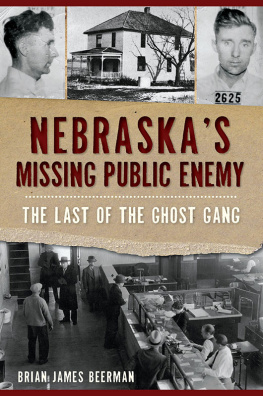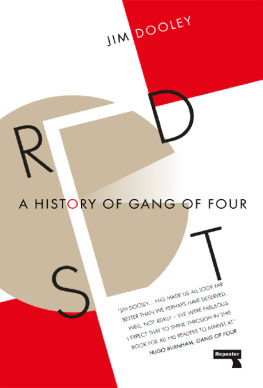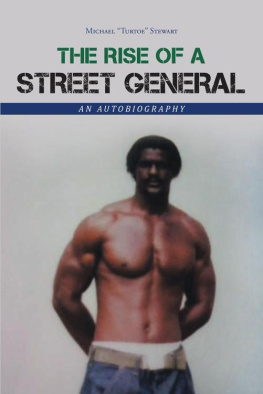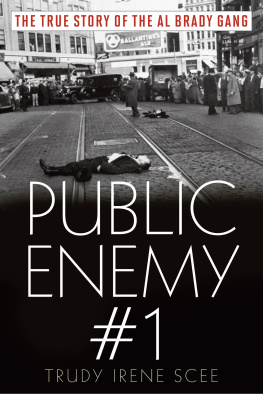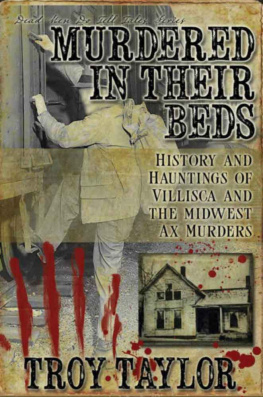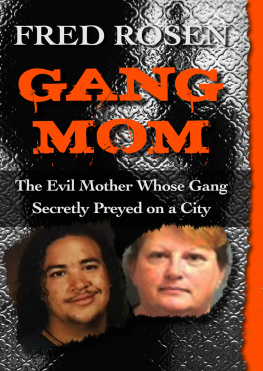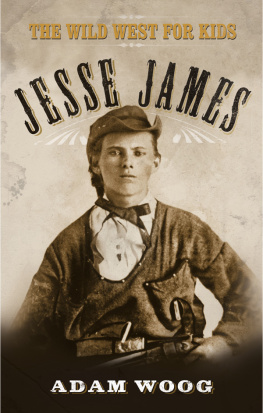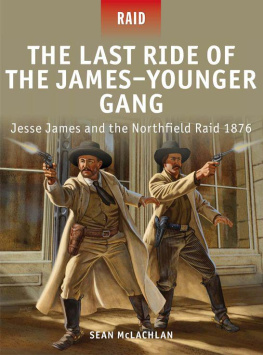

Published by The History Press
Charleston, SC
www.historypress.com
Copyright 2019 by Brian Beerman
All rights reserved
Front cover, top, left to right: Maurice Denning, profile, 1933 booking photo. Courtesy of the National Archives and Records Administration; the Hugh Berry house, Kinney, Nebraska. Authors collection; Maurice Denning, frontal, 1933 booking photo. Courtesy of the National Archives and Records Administration; bottom: Reenactment of the robbery of the First National Bank of Smith Center, Kansas. Courtesy of the National Archives and Records Administration.
E-Book year 2019
First published 2019
ISBN 978.1.43966.774.3
Library of Congress Control Number: 2019939735
Print edition ISBN 978.1.46714.312.7
Notice: The information in this book is true and complete to the best of our knowledge. It is offered without guarantee on the part of the authors or The History Press. The author and The History Press disclaim all liability in connection with the use of this book.
All rights reserved. No part of this book may be reproduced or transmitted in any form whatsoever without prior written permission from the publisher except in the case of brief quotations embodied in critical articles and reviews.
CONTENTS
Prologue
NEBRASKAS PUBLIC ENEMY NO. 1
One of the most notorious bank robbers at large.
In the summer of 1936, a man unknown to most Americans was named Public Enemy No. 1a title recently held by such notorious criminals as John Dillinger, Pretty Boy Floyd, Baby Face Nelson and Alvin Creepy Karpis. Known to his companions as Bubbles or Blondie, he was known to J. Edgar Hoover, director of the Federal Bureau of Investigation, as Maurice Denning: gunman, desperado and one of the most notorious bank robbers at large.
Although Denning was reputed to be the leader of this gang, he was still at large while his criminal associates had met their just rewards. One by one, they were killed or captured by law enforcement officers. Three of them were presently incarcerated at Alcatraz. Denning himself, however, had so far managed to elude authorities.
If Dennings name was not familiar to most Americans, he was well-known in Nebraska. He and his gang had operated extensively in the state and had obtained their name, the Ghost Gang, both from the Gage County ghost town where they briefly made their hideout, as well as from their uncanny ability to disappear seemingly into thin air whenever pursuing officers closed in. Denning was under federal indictment at Lincoln, Nebraska, for robbing the Security National Bank of Superior and was suspected of other bank jobs in Norfolk, Scottsbluff and Bartley.
What follows is the story of a farm boy who left his Depression-ridden home to become one of the most wanted men in Nebraska history. It is a story of an outlaw who managed to evade every officer of the law that ever pursued him, including the most professional law enforcement agency the world has ever known. A man who, at the height of a nationwide search for him, disappeared without a trace. Most of all, however, it is a story of love and betrayal, greed and murder. It is a story of secrets, both familial and official.
And it is all true.
A BANK ROBBERY IN BROAD DAYLIGHT
Were tough and were going to get the money.
On the north bank of the Republican River, a short distance from the Kansas state line, sits the quiet and staid little town of Superior, Nebraska. First platted in 1875, it took its name from the superior quality of the land that surrounds it. In 1934, however, Superior, like much of the rest of the country, was suffering from the worst drought on record, and the regions once rich farmland was dry, cracked and dusty. Large tumbleweeds, or dry Russian thistles, blew across the highways, causing motorists quite a bit of inconvenience. A local farmer had recently discovered that the thistles, when ground down and mixed with molasses, made a decent dry feed that was high in proteinan innovation credited with saving some of the starving livestock in the area.
Thursday, November 22, 1934, was a chilly and gloomy day in Superior. Despite the clouds, however, there was no sign of any measurable precipitation. It had been an unusually eventful week in the town of three thousand people. On Monday, one of the towns two weekly newspapers, the Superior Journal, had been auctioned off to a Kansas publisher for $4,170. The auction had brought a large group of newspapermen in from across the region. Two days later, the Superior Express announced that a new department store, Rosenbaum Brothers of Harvard, Nebraska, would soon be opening in the Riviera building on Central Avenue. Farther down Central, the Lyric Theatre was playing The Hideout, a comedy melodrama in which a gangster played by Robert Montgomery hides out in a farmhouse and falls in love with a country girl played by Maureen OSullivan. But most of the excitement in town was over the upcoming final high school football game of the season, with the Superior Wildcats facing off against the team from Smith Center, Kansas.

Central Avenue, Superior, Nebraska. The corner of the Security National Bank can be seen on the far right. Authors Collection.
Inside the Security National Bank, cashier Paul Schmeling and bookkeepers Helen Denny and George Whitney were getting ready to call it a day. It was Helen Dennys twenty-eighth birthday, and she was looking forward to going home and celebrating with her husband and family. She was working in the back room when, just a few minutes before the 4:00 p.m. closing time, three young men walked through the front door as casually as though they were customers.
Although they were wearing suits and overcoats, the men didnt appear out-of-place to Mrs. Denny. I thought they looked like farm boys, she remembered in a newspaper interview over six decades later. They were dressed that way. I didnt think they were city fellas.
Mrs. Denny started toward the front and had just made it behind the counter when one of the men stuck a pistol through the bars of the cashier cage and pointed it at her. The other two men produced a shotgun and what witnesses later described as a machine gun or automatic rifle from beneath their overcoats. The gunmen then herded the employees into the back room and told them to line up with their faces to the wall. One man told one of the others to get the lady a chair.
When one of the gunmen ordered Paul Schmeling to open the safe, the cashier lied and said the vault was under a time lock and would not open until 5:00 p.m. The gunman was not convinced, however. He said they would wait until six oclock if necessary. Were tough and were going to get the money, one of the men said.
None of the bank staff ever got a good look at any of the robbers, as they were ordered to keep their backs to the gang the whole time. It was also rather dark in the building, as the curtains had been lowered just before the men entered. Helen Denny never got a look at any of their faces. I kept looking at that gun, she recalled. I was scared. I didnt do anything.
As the bandits calmly waited for the vault to open, a farmer named Soren Christensen walked into the bank to do business. He was intercepted by one of the gunmen at the door and told to get into the back room with the others. Meanwhile, one of the robbers shook down the hostages. He relieved George Whitney of his pocketbook, which contained about twenty dollars, and even took a fifty-cent piece from Paul Schmelings pocket. Ill show you what a white guy I am, the robber told Schmeling. Ill take this fifty cents home to the wife.
Next page
